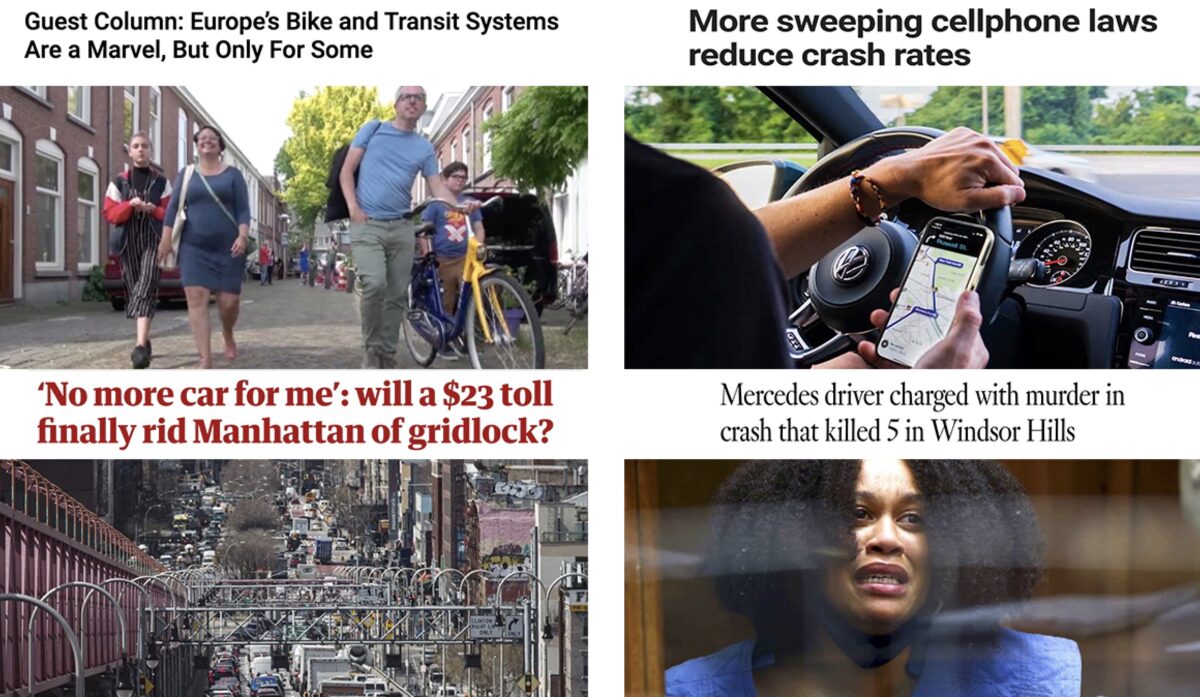
Welcome to the week.
Here are the most notable stories our writers and readers came across in the past seven days…
Process or progress?*: An op-ed from Streetsblog Mass is very relevant to Portland and it touched off a firestorm when its author criticized the approach of northern European cities because they don’t engage enough with marginalized communities. (*Yes, I realize it’s not either/or.)
Free transit: There’s a growing movement for fare-free transit in Canada as environmental activists see it as the bedrock of a Green New Deal.
Make driving expensive: The effort to impose congestion pricing in New York City took a major step forward as the project’s environmental assessment turned up great news for supporters of the plan.
When speeding is impossible: New York City has taken a very exciting step toward safer streets by installing speed limiting technology in their fleet vehicles. Hopefully other cities follow suit (good morning Commissioner Hardesty!).
Freeway fight pioneers: OPB has a must-read piece on transportation activism that chronicles the wonderful work of former Earl Blumenauer police staffer Meeky Blizzard (hi Meeky!) and her work in the 1990s to fight freeway expansion in Washington County.
Car culture consequence: A woman who sped through a Los Angeles intersection and killed five people in a fiery crash had 13 prior wrecks on her record and is now charged with murder.
Get your money: Two veteran safe streets advocates (Melissa Balmer and Leah Shahum) shares insights on Streetsblog about how to tap into a new $1 billion federal grant program that can fund vision zero and complete streets projects.
Broader laws are better: The International Institute for Highway Safety (IIHS) researched cellphone laws and found that states with laws that cover a broader range of behaviors had fewer rear-end crashes.
Not exactly “lazy”: Newly published research compared physical activity in electric bike riders to non e-bike riders and found that due to increased travel distances there’s not much difference in how much exercise they get.
Jargon-free zone: Check out this explainer from BikeRadar that seeks to demystify all the jargon used to explain bike parts and components.
Thanks to everyone who sent in links this week!



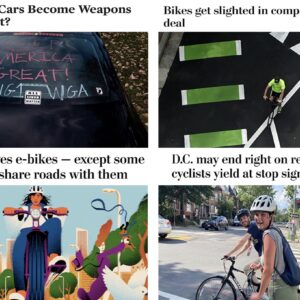
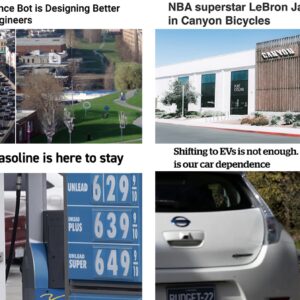
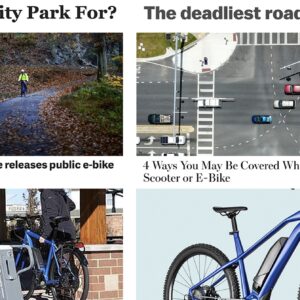
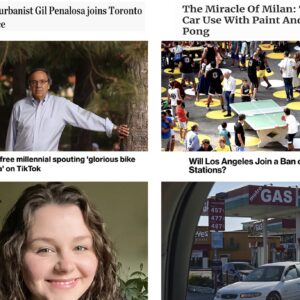
Thanks for reading.
BikePortland has served this community with independent community journalism since 2005. We rely on subscriptions from readers like you to survive. Your financial support is vital in keeping this valuable resource alive and well.
Please subscribe today to strengthen and expand our work.
RE Car culture consequence: Blaming this horrific crash on “car culture” is like blaming the death of Michelle Go (in NYC) on “subway culture”.
The thing I don’t understand is how why any insurance company was willing to give her a policy after 12 prior crashes. And how someone with a driving record like that hadn’t accumulated enough tickets to have her license revoked. Unless, of course, LA has also ceased enforcing traffic laws.
The article did not mention insurance. Do you have any evidence that the driver who allegedly killed 5 people was insured?
Allegedly?
ok…allegedly murdered. (i realize almost everything fair about our legal system is being undermined by the radical christianist supreme court but this is still technically how it is supposed to work.)
Just when you thought BikePortland couldn’t get any more radical.
Guilty until proven innocent, huh?
weird it’s almost like people think that woman was framed for murdering a family with her vehicular violence.
Not framed, but also not allowed due process, yet. I’m not saying she’s not guilty, I’m saying that we’ll find that in a court of law. Maybe she had a seizure this time?
*edit* If you think jumping to conclusions and calling her guilty, BEFORE trial, is okay in this instance, it’s okay in all others.
You’re right, murder requires a higher bar of proof (you have to act in a way that you *know* has a high chance of killing someone) than manslaughter.
I’m willing to wait for the case to actually be tried before saying that she murdered them.
That she killed those 5 people, that’s something I’m more than willing to say, as it’s simply a statement of fact. It doesn’t matter if she had a medical emergency, was distracted or drunk.
Keep in mind the murder charges were brought based on her past history of over a dozen collisions. The DA in this case believes he can show that she was cognizant of the dangers of her actions.
If you honestly thought that, you have a very narrow perspective of the world.
But are you being honest, or facetious?
So, a BikePortland commenter says in effect, “Let’s not accuse the driver of killing five people until they get their day in court” and you view that as proof that BikePortland has gotten MORE radical? That’s not logical.
No, that’s not what I said at all. I was simply referencing the way our judicial system works. This has nothing to do with my personal beliefs or preferences. For example, I personally believe that in a democracy trial by empaneled committees of judges (or designates legal experts) should, at the very least, be an option for serious crimes. IMO, jury trials are one of the ways our legal system perpetuates its staggeringly unjust legacy of racism, classism, and bias.
My comment was based on your writing “allegedly”, which I’d assumed was what the other commenter was responding to.
you answered your own question Watts. Perhaps I have a more expansive definition of “car culture” than you are used to. To me, it’s the systemic forces that keep driving cars at the center of American life. Without those forces being so strong, I don’t think this crash would have happened.
I’m not sure I follow you — insurance is a for-profit business that understands risk, and they don’t make business decisions based on “car culture”. I guess you could argue that not enforcing traffic laws is a symptom of car culture, but I’m not sure I would agree with that. The driver has been charged with murder.
But, as Soren points out, I am assuming the driver was insured, that she had a valid license, and that her driving was chronically bad enough to attract the attention of law enforcement. I have no evidence for any of these.
Or that an urban city street could be built that somehow allows a relatively sober driver to rev up to 90 mph before killing several innocent pedestrians. And yet we keep building such streets everywhere. It’s as if we as a society aim for communal suicide through our transportation environmental design (and technology). We don’t necessarily need guns and an overused 2nd amendment to kill large numbers of innocent people, cars and poor roadway design seem to work just as well.
If my physics are right, a car capable of accelerating from 0 to 90 in 10 seconds could reach 90mph from a dead stop in about 650 ft. How do we design functional streets that make this impossible?
I don’t see any way to address street safety without addressing driving behavior.
There are lots of ways to design streets against that kind of driving, but we could also prohibit any car with that kind of obscene acceleration from being anywhere but a race track.
First, I don’t believe that her Mercedes can do 0 – 90 MPH in 10 seconds. Now 650 feet is a possibility, but I am having trouble believing the intersection is that long. My estimation is more like 83 feet. The article clearly states she ran the red light, so the vehicle was at 90 when it entered the intersection. That’s 132 feet per second, it took less than a second to cross the intersection. I am with you on trying to design a street that would have prevented the murder of the pedestrians crossing the road would be very difficult. I think a change in driver behavior is a good approach. To accomplish this, we need enforcement by actual officers. A ticket received in the mail a month after the infraction does not have the same effect as being pulled over. Next, we need to change how we license drivers in this country. First make getting a license harder. As it stands now every 8 years (Oregon) you pay the renewal fee and your done. I would like to see the renewal require a written test as a minimum. Passing an actual driving test should be done for older drivers and anyone receiving a ticket since the last renewal. Also, this needs to be standard across all states. Re designing streets and adding technology to new vehicles still needs to happen. The problem with these is the amount of time it takes to implement them.
I re-took the written test a couple of years ago, and I do not share your confidence that taking it again would in any way help people’s driving.
I didn’t get 100%, but does it really matter whether I misguessed the distance at I can follow a fire truck? When I am driving, how far is 150 ft exactly? Beats me! But I think I do have good judgment about how and when and where I can follow a fire truck.
If we are not going to enforce our laws (or even if we are) the current levels of mayhem will end only with automation.
The biggest *practical* issue with relying on officers to control people’s speed is that it’s impossible for them to be everywhere.
Most people who break laws of any sort don’t believe they will be caught.
The very small chance of a ticket is simply not a deterrent.
The advantage of ubiquitous speed cameras is that you *always* get caught, therefore most people stop speeding in those areas (in NYC the vast majority of people have 1 speeding ticket in the speed camera zones, some 2).
The next huge issue is that people who continue to behave in the manner the driver of the Mercedes did (IE – repeatedly getting into collisions with other cars) are a problem of an entirely different sort:
They don’t care.
The classic example of this is the drunk driver who, in 1986, drove the wrong way up an offramp by McMinnville colliding with a vehicle carrying 4 of my classmates.
Sisters, 1 paralyzed 1 with a shattered pelvis, my across the street neighbor with her maxilla and orbital bones shattered and the other red head in my class with her ear severed.
He had multiple DUII convictions, had had his license revoked and had multiple vehicles impounded.
It didn’t stop him from driving, drinking and hurting people.
So, unless you’re willing to jail people for this sort of repeat infraction, it’s almost impossible to actually get them off the street.
“unless you’re willing to jail people for this sort of repeat infraction”
If it is the only way to get people to stop putting others in grave danger, I am willing.
Increased jail time = Increased staffing + more expensive prisons + more recidivism + more judges + more jury duty + more courts + more lawyer fees + bigger police budgets + more big brother cameras + more poor people left to rot in jail awaiting trial = vastly increased taxes and/or vastly reduced budgets for parks, housing, homeless, schools, etc.
Better to let innocent people be killed by an unrepentant dangerous driver? I’d prefer less drastic alternatives if you know any. When license revocation doesn’t work, what would you propose?
We don’t know yet if the driver is unrepentant, but assuming as you do that she is so, our main powers are to either lock’er up, which may or may not prevent her from causing further harm (she’ll get out eventually), or to remove the means for her to cause harm with her automobile (we both know how easy it is for any person to get control of an automobile even with a revoked license).
Since we allow 20 mph governors on rented electric scooters and electric bikes, why not impose them on personal cars and trucks too? Yeah, traffic will much slower and it won’t prevent drivers from continuing to hit pedestrians and bicyclists, but at 20 mph fatalities and life-changing injuries will be massively reduced, plus there will be far less pollution and far greater energy efficiency. And at 20 mph, many people who might otherwise drive may decide that mass transit or bicycling is faster.
Unfortunately, if the same person wants to go out and shoot people, there’s absolutely nothing we can legally do about it.
Quote of the week! “…communal suicide….”
If there was:
Then you could for sure blame Michelle Go’s death on “subway culture”.
I agree there are negative trade-offs, but think of the benefits of our subway culture:
By moving our transport underground as much as we have, we’ve helped to create the bike and pedestrian paradise that we now all enjoy.
Process or Progress: When I was a MURP student in the late 1990s, a group of us visited Vancouver BC and talked planning with some UBC planning students. They pointed out that the original Skytrain line from downtown to Surrey was shoved through the poorest and least vocal neighborhoods, much like 1970s freeways in the USA, and that the agency that reviews and has the final say-so on environmental issues for transportation is the province (BC) and not the federal government (Ottawa), while the transportation agency designing and building the system (BC Transit) is also provincial. Guess what the environment impact statement said?
When I visit Europe, I do note that most poor minorities don’t live in the inner touristy parts of town (even if they work there), but in suburban hellholes of high ugly concrete towerblock apartments, particularly around Paris, London, Glasgow, Leeds, Brussels, Lille, and most German, Italian and Dutch cities. The areas are not particularly bike friendly, but until this article I wasn’t aware that they are also by and large transit-poor. That they lack other amenities is pretty obvious as they tend to be the center of major riots against police.
And while we white Americans have an extraordinary awful record on how we’ve treated slaves and former slaves, indigenous groups and nations, immigrants and refugees, and of course each other, the same sort of record in any European country is if anything even worse than here. French versus colonial North Africans, Germans versus Turks and other middle eastern immigrants, Swiss versus the majority in the country who aren’t allowed citizenship, Belgians versus Congolese, Dutch versus Indonesians, British versus Irish, Afro-Caribbeans and Indians, Canadians versus Metis, and so on and so forth. And that record is relatively benign and enlightened compared to their record in the 1930s and 40s.
Non-Europeans don’t exactly have a great record of treating one another well either.
Human beings don’t have a great record of treating any other living being well.
Re congestion pricing. This is a step in the right direction. But I worry that all the billions in road infrastructure will end up sold to the rich at a massive discount so they can speed around while the poor are forced to wait for the bus. Better to not build (or remove) the wasteful road infrastructure in the first place. The public should not be in the business of subsidizing polluting, wasteful transportation for the rich.
Portland’s POEM process recently punted on area congestion pricing and there was nary a peep of online disapproval from many urbanists, “youth climate activists”, and allied cycling advocates. This pathetic outcome only reinforced my perception that many cycling and “urbanism” advocates in Portland are not primarily focused on decarbonization and public safety but rather on promoting “bougie” urban development that benefits the few (not the many).
Every person who ever has control of a motor vehicle of any sort has the ability to create a moving local zone of respect for safe speeds. If I drive 35 mph in a 25 zone, it creates a gap in traffic that allows another person to accelerate to 45 to make a light or catch up to the bus or whatever it is they plan, driving that fast on a surface street. We all know 35 won’t get you a ticket, but it enables even worse driving decisions.
If I drive at 25, a yawning gap will open between me and the driver ahead which another driver can use to hit 45.
It’s hard (and occasionally dangerous) to regulate the behavior of other drivers.
Wow, is that Streetsblog editorial just ignorant. I’m reminded of a quote from Billy Madison…
One of the dumbest things I’ve ever read: “From what I observed, people of color, immigrants, and low-income people are not prioritized in decision making in these two cities. Climate, impeccable design, and engineering are.” That is because climate impacts, the dangerousness of bad design and poor engineering will have a far larger impact on future generations then what color this generations skin is or their socio-economic status. Making it easier for people to get places integrates them into a society faster and opens up options in schooling and work, which helps socially, economically and culturally – and that is a good thing. By & large, Europe does that better than the USA. If cities like New York or Chicago went “full Copenhagen”, it help do far more to help the very people the author claims are not being prioritized then a bunch of lip service to inclusivity. Besides, given the amount of inter-racial marriages in Europe (and the USA), at present rates, in a generation or two most European descendants will back to their original coloring. So yeah, prioritizing climate, design and engineering is more important in the long run because those things actually matter.
What?!? Even our skin color is cultural appropriation?!?
There are a ton of smart comments to that editorial!
Regarding the “Westside Bypass” how about the 100% ramp free option: a long tunnel? Would help get national / regional thru freight off of I-5 and I-205. And not recreate the land use traffic congestion mistakes of I-205…
Or just build another set of train tracks out there if you want to address regional and national freight needs. You can move a lot more stuff more economically by train.
Jonathan typo notice: “ former Earl Blumenauer [police?] staffer Meeky Blizzard”
PS> I miss Meekly too.
I learned a great new phrase from reading the comments on the silly article about Amsterdam. “High minded obstructionism” is a perfect description of what keeps Portland from making any progress on the largest issue we face today.